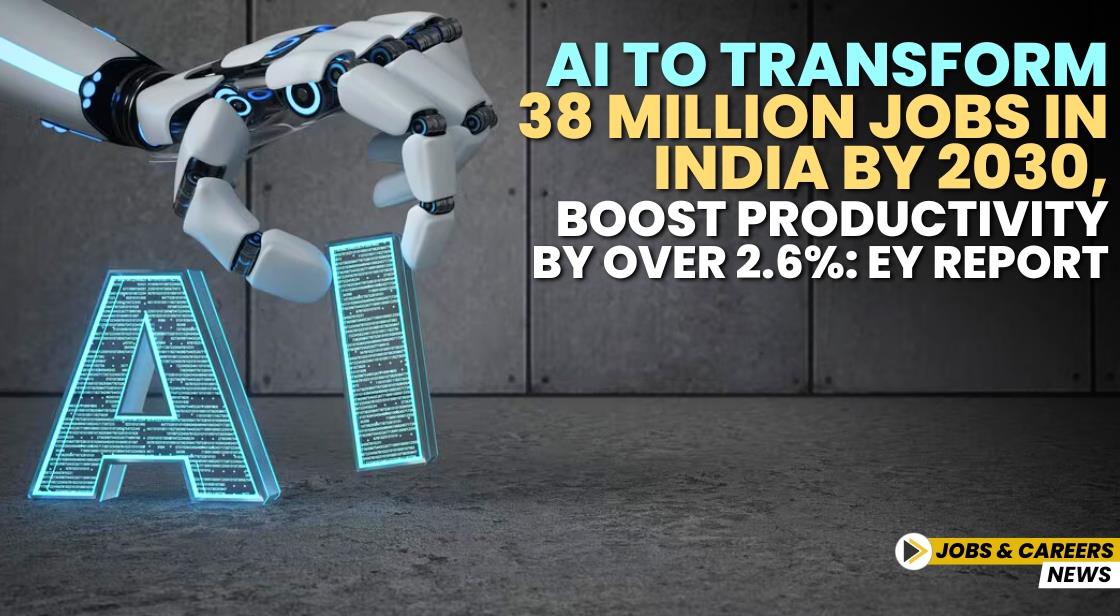AI to Transform 38 Million Jobs in India by 2030, Boost Productivity by Over 2.6%: EY Report

News Synopsis
Artificial Intelligence (AI) is on track to revolutionize the Indian workforce, with its adoption set to transform approximately 38 million jobs by 2030. According to EY India’s latest report titled "How much productivity can GenAI unlock in India? The AIdea of India: 2025", generative AI (GenAI) could boost the country’s productivity by 2.61% in the organized sector. An additional 2.82% growth could be realized if the unorganized sector adopts GenAI solutions.
AI's Potential to Reshape Industries
The report emphasizes the transformative potential of AI in automating tasks and enhancing efficiency across various sectors. It estimates that 24% of tasks across industries could be fully automated, while another 42% could be significantly augmented, allowing knowledge workers to save 8-10 hours weekly.
Among industries, the services sector is poised to gain the most in terms of productivity, thanks to its higher labor-to-output ratio. Conversely, manufacturing and construction are likely to experience a more modest impact.
Top Business Processes to Benefit from AI
EY’s analysis of over 10,000 tasks across industries outlines the following productivity enhancements:
-
Call Centre Management: Up to 80% increase in efficiency.
-
Software Development: Potential productivity boost of 61%.
-
Content Development and Distribution: Expected improvement of 45%.
-
Customer Services: Productivity could rise by 44%.
-
Sales and Marketing: Gains of around 41%.
In sectors like IT/ITeS, healthcare, and banking, the anticipated productivity enhancements are 19%, 13%, and 8-9%, respectively. Meanwhile, industries such as automotive and pharmaceuticals may see marginal growth of about 2%, owing to their relatively lower labor contributions.
Insights from Industry Leaders
Rajiv Memani, Chairman and CEO of EY India, underscored the profound implications of GenAI for India's economy:
"GenAI is transforming India’s economic landscape by unlocking unprecedented opportunities across sectors. This revolution will fundamentally reshape jobs, driving productivity and innovation.
Building talent pipelines and prioritizing upskilling must be at the forefront of every organisation. By fostering public-private collaborations and investing in talent development, India can also become a global hub for AI-skilled talent."
Mahesh Makhija, Technology Consulting Leader at EY India, highlighted the reshaping of industries:
"In industries like financial services, healthcare, and retail, AI will reshape basic processes including customer acquisition, operations, and service, while IT/ITeS and BPO will undergo more dramatic changes.
Next-generation industries like biotech, advanced manufacturing, and renewables will have the potential to leapfrog to AI-first business models. To maximize the potential for economic growth, India needs to focus on AI policy agenda, compute infrastructure, AI research, addressing challenges in responsible governance, intellectual property rights, and data protection."
Barriers to AI Adoption in India
While the promise of AI is immense, the EY report highlights several challenges hindering widespread adoption:
-
Talent Shortage: Only 3% of Indian enterprises report sufficient in-house talent to leverage AI, while 97% cite a lack of skilled professionals as a major barrier.
-
Early Adoption Stage: Just 15% of surveyed companies have implemented GenAI at scale, with many still in the proof-of-concept stage.
-
Data Readiness: Only 3% of enterprises report being fully prepared for AI deployments, while 23% are not data-ready.
Focus on ROI and Falling Costs
Measuring the Return on Investment (ROI) remains a critical factor for GenAI adoption. The report notes that just 8% of enterprises with GenAI in production are capable of accurately measuring and allocating AI-related costs. This underscores the need for standardized frameworks to evaluate AI's financial impact.
Conclusion: A Roadmap for the Future
The EY report paints a promising picture of India’s AI-driven future, but it also calls for urgent action to address barriers such as skill shortages, data readiness, and responsible governance. By fostering collaborations, investing in talent, and adopting a systematic approach to measuring AI’s impact, India has the potential to emerge as a global leader in AI innovation and adoption.
You May Like









